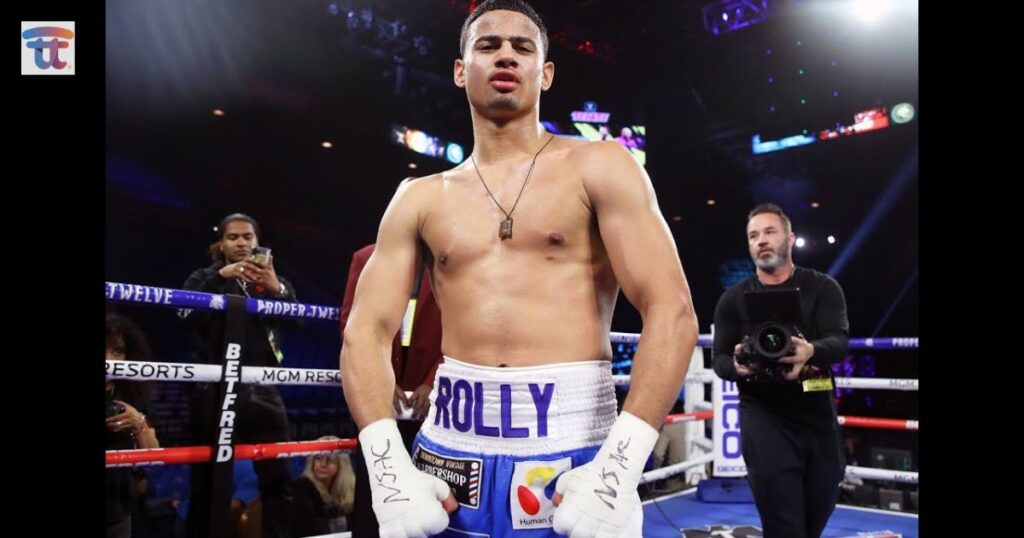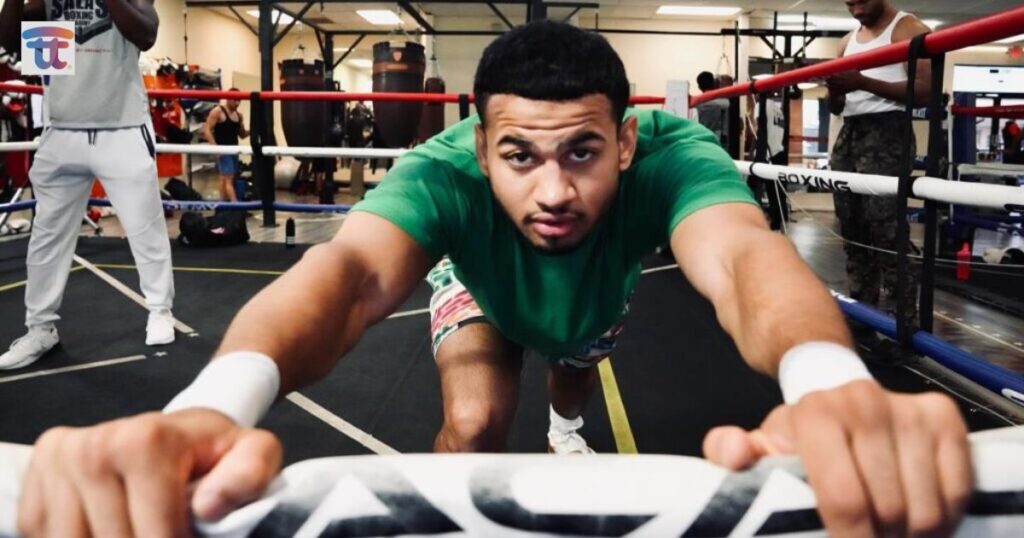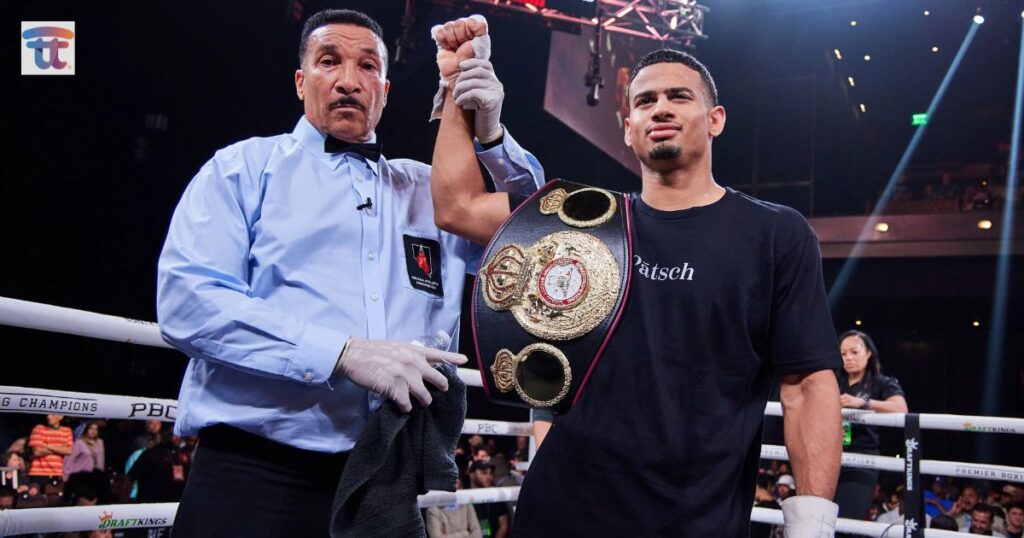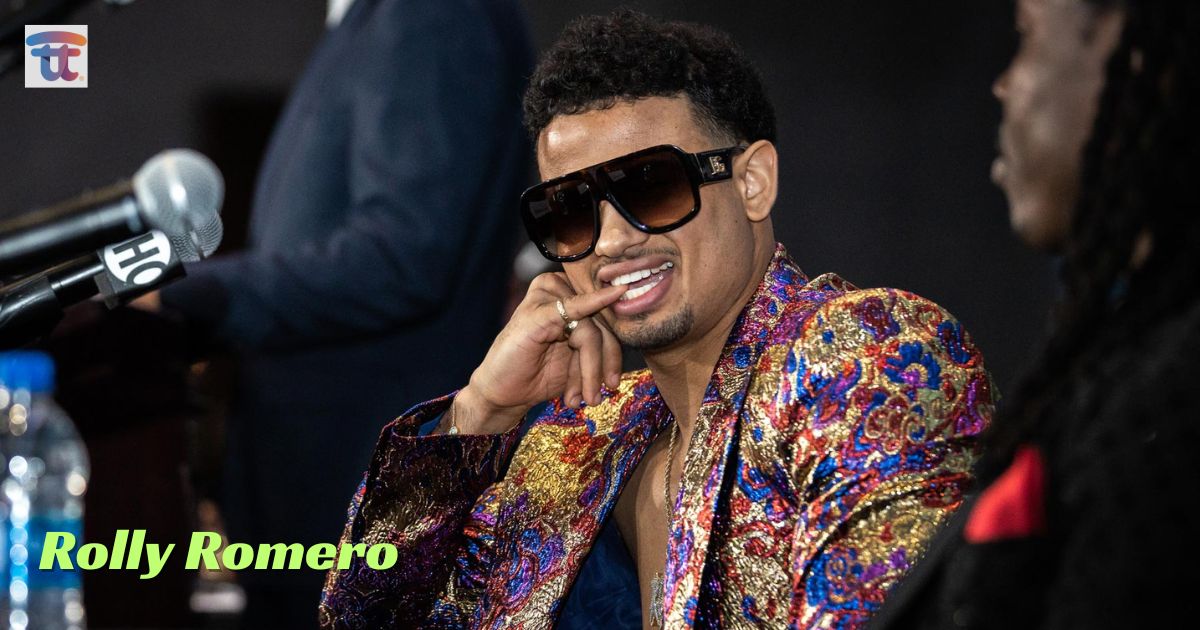Rolly Romero, a Cuban-American boxer renowned for his resilience and distinctive style, has become an influential figure in the boxing world. With a compelling background rooted in Cuban traditions in sports and American sports culture, Romero embodies the spirit of cultural fusion.
Born and raised in Las Vegas, Nevada, his story reflects the strength of immigrant family values and a relentless drive to succeed.
In this in-depth article, we’ll uncover the layers of his Cuban-American identity, the impact of his parents’ origin, and his rise in the lightweight boxing champion ranks.
Rolly Romero Cultural Background
| Category | Information |
| Full Name | Rolando “Rolly” Romero |
| Date of Birth | October 14, 1990 |
| Birthplace | Las Vegas, Nevada |
| Nationality | American |
| Ethnicity | Cuban-American |
| Height | 5’8″ (173 cm) |
| Weight Class | Lightweight |
| Boxing Record | 14-1-0 (12 KOs) |
| Notable Title | Former WBA Interim Lightweight Champion |
| Style | Orthodox |
| Trainer | Rolando Romero Sr. (Father) |
Growing up in the vibrant and bustling streets of Las Vegas, Rolly Romero found himself immersed in two distinct yet complementary worlds.
At home, his parents infused their Cuban heritage into his upbringing, filling his life with the rich traditions, values, and resilience that define Cuban culture.
At the same time, the electrifying American boxing scene shaped his aspirations, providing the foundation for his athletic journey.
This unique cultural blend created a boxer unlike any other. Rolly masterfully combines the precision and technical expertise of Cuban boxing with the bold, flashy showmanship that American fans adore.
Whether it’s his nimble footwork, commanding presence in the ring, or charismatic interviews before fights, Rolly embodies a perfect fusion of these two powerful influences.
Rolly Romero Cuban Heritage
Romero’s parents hailed from Cuba, a nation celebrated for producing world-class boxers. The Cuban boxing legacy is steeped in discipline, strategy, and an unmatched work ethic—qualities that define Romero’s fighting style.
His father, Rolando Romero Sr., was a professional boxer in Cuba and became his first trainer, instilling in him the Cuban fighting spirit from an early age.
Beyond the ring, Cuban traditions permeated Romero’s upbringing. Family gatherings were filled with vibrant music, hearty meals, and stories of resilience—a testament to the sacrifices his parents made to give him a better life.
This cultural foundation not only grounded him but also gave him a unique identity that resonates with fans from similar backgrounds.
Rolly Romero American Upbringing
Las Vegas, often referred to as the boxing capital of the world, provided Romero with unparalleled opportunities to grow as an athlete.
Immersed in American boxing traditions, he trained in world-class facilities and interacted with legendary fighters, all of which fueled his aspirations.
The fast-paced lifestyle of Las Vegas also shaped Romero’s charisma and confidence, traits that make him a showman inside and outside the ring.
Despite his American upbringing, he maintained a deep connection to his Cuban-American identity, blending the tactical patience of Cuban boxing with the explosive energy typical of American fighters.
Rolly Romero Impact on Boxing Career
The cultural influence on boxing is evident in Romero’s career trajectory. His ability to seamlessly integrate Cuban techniques with American showmanship has set him apart.
This fusion is particularly noticeable in his footwork, defensive strategies, and his knack for delivering powerful knockouts.
Romero’s fights often reflect the struggles and triumphs of his heritage. Whether it’s his unwavering determination or his ability to adapt to opponents, his performances are a testament to the immigrant success stories that inspire many.
Rolly Romero Ethnicity

Rolly Romero’s ethnicity as a Cuban-American plays a central role in his identity as both a boxer and a public figure. Ethnicity is more than a label for Romero; it’s a source of pride and motivation.
His dual heritage allows him to connect with diverse audiences, uniting fans through his authenticity and talent.
In interviews, Romero frequently speaks about the importance of honoring his roots. This commitment to preserving his Cuban-American identity has earned him admiration from communities across the globe.
By representing two distinct cultures, he bridges gaps and proves that diversity is a strength in sports.
Rolly Romero’s Professional Career
Rolly Romero’s career is a masterclass in perseverance and growth. From humble beginnings to becoming a bilingual boxing champion, his journey is a blend of hard work, strategic training, and the unwavering support of his family.
Early Career and Rise
Romero’s path to professional boxing began in 2016, following years of rigorous training under the guidance of his father.
His amateur career, though brief, showcased his potential, and he quickly made waves in the professional circuit.
One of the defining aspects of his early career was his adaptability. Despite limited amateur experience, Romero developed a reputation for his aggressive style and knockout power.
His debut victory was a statement of intent, signaling the arrival of a new force in the lightweight boxing champion division.
Rolly Romero Professional Success and Notable Fights
Romero’s rise to prominence was marked by significant milestones. In 2020, he claimed the WBA Interim Lightweight Title, cementing his place among the division’s elite.
High-profile bouts, such as his fight against Gervonta Davis, further solidified his status, even in the face of setbacks.
| Year | Notable Achievement |
| 2016 | Professional debut victory |
| 2019 | Secured first regional title |
| 2020 | Won WBA Interim Lightweight Title |
| 2021 | Ranked #5 by WBA |
| 2022 | Major pay-per-view headliner |
Romero’s ability to learn from defeats and come back stronger demonstrates his resilience—a quality deeply rooted in his Cuban fighting spirit.
Rolly Romero Recent Developments
In recent years, Romero has continued to refine his skills, focusing on versatility and defense. His training camps, often grueling, highlight the boxing training methods passed down by his father.
These methods emphasize precision, endurance, and mental toughness—hallmarks of the Cuban boxing legacy.
Notable Career Achievements
Rolly Romero’s achievements go beyond titles. His journey is a source of inspiration, showcasing the power of dedication and cultural pride.
Rolly Romero Parents’ Origin

The story of Rolly Romero’s parents is one of courage and resilience. They emigrated from Cuba to the United States, seeking better opportunities for their family. This journey was fraught with challenges, but their determination laid the foundation for Rolly’s success.
Romero’s father, a former professional boxer, was instrumental in shaping his career. His mother, on the other hand, provided emotional support and instilled in him the values of hard work and humility. Together, they exemplified the immigrant family values that continue to guide Romero.
Rolly Romero Siblings
Family plays a pivotal role in Rolly Romero’s life. He often speaks about the influence of his siblings, who contribute to the boxing family dynamics that define his support system.
Rolly Romero Older Brother
As the eldest, his brother served as a role model and a source of motivation. While not a professional boxer, his involvement in Rolly’s life highlights the importance of sibling support in achieving personal and professional goals.
Rolly Romero Younger Brother
His younger brother shares a close bond with Rolly, often attending his matches and providing moral support. This camaraderie reflects the unity of the Romero family.
Rolly Romero Younger Sister
Rolly’s younger sister, though less involved in boxing, is a vital part of his life. Her presence reminds him of the importance of staying grounded amidst the chaos of a high-profile career.
Behind the Scenes of Romero’s Training Camp
Rolly Romero’s training camps are a blend of tradition and innovation. Guided by his father’s experience, he incorporates Cuban boxing techniques with modern fitness regimens. These camps often include intense sparring sessions, strength training, and meticulous strategy development.
The emphasis on discipline and precision reflects the Cuban traditions in sports, while the use of advanced facilities in Las Vegas underscores the influence of American sports culture.
Impact on Boxing Community
Rolly Romero’s influence extends beyond the ring. As a prominent figure in the sport, he serves as a beacon of hope for aspiring athletes from immigrant families. His success story highlights the potential of cultural fusion in sports to create something extraordinary.
Social Media Presence
Romero’s presence on platforms like Instagram, Twitter, and TikTok allows him to connect with fans worldwide. His bilingual nature enables him to engage with both English and Spanish-speaking audiences, further solidifying his Cuban-American identity.
Looking Ahead: The Future of Cultural Fusion in Boxing

Rolly Romero’s career is a testament to the power of diversity in sports. As he continues to represent the Cuban-American community, he paves the way for future generations of multicultural athletes to excel in boxing.
Conclusion
Rolly Romero’s journey exemplifies the power of cultural diversity and determination in shaping a champion.
As a Cuban-American boxer, he blends the precision of Cuban boxing traditions with the charisma of American sports culture, creating a unique identity in the ring. Rooted in the values instilled by his immigrant parents, Romero’s career is a testament to resilience, discipline, and cultural pride.
His success resonates with fans worldwide, inspiring others to embrace their heritage while striving for greatness. Whether through his achievements, training methods, or his connection with fans, Romero represents the future of cultural fusion in sports.
His story is not just about boxing—it’s about breaking barriers and proving that heritage can be a fighter’s greatest strength.
FAQ’s About Rolly Romero
What makes Rolly Romero’s fighting style unique?
Romero’s style blends the tactical patience of Cuban boxing techniques with the aggression of American boxing traditions.
How did growing up in Las Vegas influence Romero’s career?
Las Vegas provided access to world-class facilities and exposure to top fighters, shaping him into a well-rounded athlete.
Does Rolly Romero speak Spanish?
Yes, Romero is bilingual, allowing him to connect deeply with his Cuban-American identity.
How has his Cuban heritage influenced his boxing career?
His heritage instilled discipline, resilience, and a deep respect for the Cuban boxing legacy.
What role does family play in Rolly’s boxing career?
Family serves as the backbone of Romero’s life, offering unwavering support and guidance.
What is Rolly Romero’s most significant achievement in boxing?
Rolly’s most notable accomplishment is winning the WBA Interim Lightweight Title in 2020. This victory solidified his reputation as a rising star in professional boxing.
Who is Rolly Romero’s trainer?
Rolly is trained by his father, Rolando Romero Sr., who has played a crucial role in shaping his Cuban-American identity and unique boxing style.
What languages does Rolly Romero speak?
Rolly is bilingual, fluently speaking both English and Spanish. This allows him to connect with fans across cultures and honor his Cuban roots in boxing.
How does Rolly Romero stay connected to his Cuban heritage?
Rolly embraces his Cuban traditions in sports through his fighting style, family values, and love for Cuban cuisine, often blending these elements into his daily life and career.
What is Rolly Romero’s fighting style?
Rolly employs an orthodox stance with a mix of technical Cuban precision and American aggression. His style is a true embodiment of cultural influence on boxing.
How has growing up in Las Vegas shaped Rolly Romero’s career?
Las Vegas’ vibrant boxing scene provided Rolly with access to world-class training facilities and sparring opportunities, sharpening his skills and introducing him to American sports culture.
What message does Rolly Romero’s story convey to young athletes?
Rolly’s journey as a multicultural athlete inspires young boxers, especially from immigrant families, to embrace their heritage and work hard to turn dreams into reality.

I’m Zoey Agca admin of this website.








